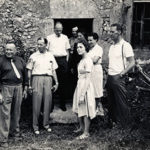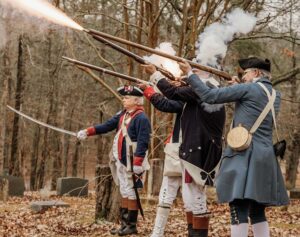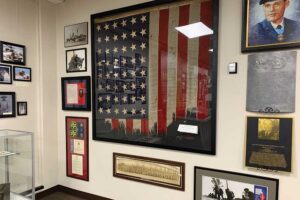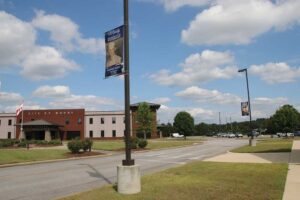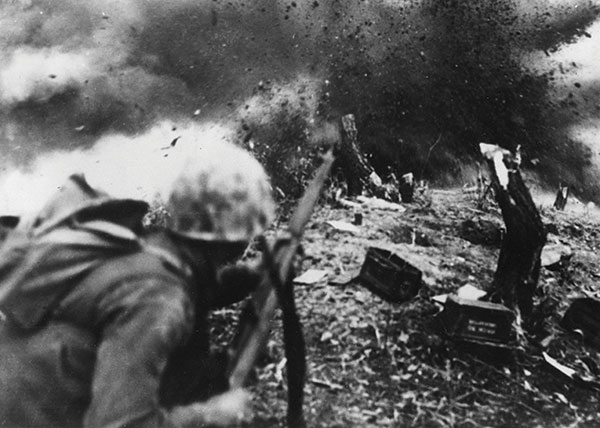

Stories from Korea, Vietnam and Iraq
Story and photos by Graham Hadley
Contributed photos
Three wars, three generations, three soldiers — all U.S. Marines and all volunteered for service.
And all said, without hesitation, they would do it again.
Retired from service now and living in the Col. Robert Howard Veterans Home in Pell City, the three soldiers recounted their experiences in the military and how that service has defined who they are and how they have led their lives.
Sgt. John Weaver, Korean War
Tough – no better word describes retired Marine Sgt. John Weaver. Even in his 80s, wearing his trademark kilt, the veteran soldier, a member of the elite Marine Recon unit, exudes an unfailing determination and inner strength.
But Weaver says that is not always how people saw him. Before his service in the Korean War, he first had to prove himself in the U.S. Marine Corps Basic Training Camp at Parris Island, S.C. The USMC training is notoriously difficult, and Weaver says he did not appear to fit the bill because, in his words, he is so short.
“At Parris Island, I was the little guy,” he said with a grin. On the obstacle course, the recruits have to scale a tall, vertical wood wall. “Boy did they put it to me on that wall, and boy did I make it over. They never thought I would.
“So, I got a running start, kicked my foot as hard as I could into the bottom board, got a toehold, and launched myself over the wall. My sergeant looked at me and said, ‘Weaver, do that again.’ So I did, again and again,” he said.
That rigorous training only stepped up a notch as he continued to prove himself, earning a spot in Recon. “I was hell on wheels. We all were. Recon was like a Marine Corps inside the Marine Corps. The other soldiers would not even walk across the grass in front of our barracks.”
His small stature quickly became an asset. He could move through places other Marines could not fit, and he did so silently – a trick he learned from his father, who had been in the Canadian military – allowing him to take enemies by surprise.
“That was one of the first things my father taught me. And I remember it to this day. He was tough, too.”
Weaver was also a crack shot, particularly with his two weapons of choice, the Springfield M-1 Garand battle rifle – our main infantry rifle in both World War II and Korea – and the standard military 1911 .45-caliber pistol.
“The first time on the range with the M-1, I put every round through the bull’s eye. I am a crack shot,” he said. Something he has passed on to his children, teaching them how to shoot and safely handle a firearm as they grew up. One daughter is so good she is a marksmanship instructor, something Weaver is very proud of.
That toughness and skillset proved invaluable to Weaver when he was deployed to Korea in the closing months of war in late 1952 and early 1953. During his time in combat, he racked up an impressive list of medals, both from the U.S. military and the South Korean Government, eventually receiving one of their highest military honors, the equivalent of the Medal of Honor in the United States.
Like many veterans, Weaver says he does not often talk about his time in combat, especially with people who have not been there. “Most people who have not done it just don’t understand,” he said.
He does not sugar coat his experiences. “My job was to kill the enemy soldiers. And I was good at it. Very good at it. And I don’t feel remorse for it. Don’t get me wrong, there were times I was shooting them, killing them and killing them, and there were tears in my eyes – they were soldiers, too, and they were doing the exact same thing I was. But I was better at it. I don’t feel bad about it then, and I don’t feel bad about it now. It was what I had to do, kill them.”
At one point, Weaver, three other Marine sergeants and a private were all that was left of their unit, trying to hold a piece of ground against advancing North Korean and Chinese units.
“We kept shooting and shooting. Some of us were wounded, but we kept shooting. That was what I received some of my medals for. I must have killed 200 of them that day, maybe more. There were only five of us left. I kept firing and firing, even after I was hit.
“The other men with me had guts, real guts – guts, guts, guts. I was not going to let them down. Even after I was wounded twice.”
Those five men held out for almost a day against continual opposition from advancing soldiers until they were eventually relieved by U.S. reinforcements.
“They said we killed more than 500 people that day. I am not proud of it, I am not embarrassed by it, I don’t feel bad about it, even now. We were tough, and we had to do it. It was war and that was our job.”
Eventually, in the summer of 1953, the Korean War was halted and Weaver returned home. He never intended to leave his beloved Marine Corps, but he knew if he wanted to be a better Marine, he needed better education.
“I had dropped out of school at 17 to join up. I knew I needed more education,” he said. He began attending school to finish up his high school education and more, always intending to return to the Marines.
“But then I got married, and that ended that,” he said. Eventually he got a job in the food industry, and actually worked for years with a fellow member of the Marine Recon unit who had seen service in Korea.
“We just knew who we were without having to talk about it. We were Marines.
“We were Marines in Korea, we were Marines then, I am still a Marine, and I will always be a Marine. If I could go back today, I would,” said the veteran, steady eyes looking out from under his Marine Recon cap.
His advice for people looking to enlist today? Consider it an honor to serve your country, but make the decision very carefully.
“Those were rough times. I remember every day everything I did then. … It is no little decision to join the Marines,” Weaver said, but he would join back up in an instant..
“I am just an old Marine at heart. I am still a Marine,” he said proudly.
Sgt. Joe Stephens, Vietnam
Retired Marine Staff Sgt. Joe Stephens is quick to downplay his role during the Vietnam War. As an aviation mechanic, he was not on the front lines and only rarely came under fire, usually from missiles or unguided rockets aimed toward his base.
But his actions prove that many of the soldiers on the front lines owe their lives to the people supporting them from the rear.
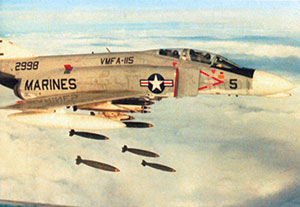
Like all the other soldiers interviewed, Stephens was not drafted, he volunteered.
Originally from Oxford, the small-town Alabama environment played a big part in that decision.
“I was really patriotic. The flag in school was very important. I was fascinated with history, how we won our independence. I wanted to serve our country,” he said.
But it was a strange time to be serving in the military, the end of the 1960s and beginning of the 70s, with peace protests at Kent State, the deaths of Dr. Martin Luther King Jr. and Bobby Kennedy and President Nixon’s back and forth on the United State’s position in Vietnam, eventually leading to our withdrawal from the war.
“I volunteered right after Kent State. And after I was deployed overseas in a combat zone, we would hear the news about what was going on back home. There was lots of stress. And there was real racial stress, too,” he said.
But they were soldiers in a war zone and had jobs to do. His was to maintain aircraft, particularly the F4 Phantom, the mainstay multi-role fighter jet for the U.S. military in Vietnam, and the iconic Bell UH-1 Iroquois Huey helicopters that have become something of the symbol of the war for our country. He also worked on the twin-rotor CH-47 Chinook helicopter – another workhorse of the military in Vietnam.
And he loved his work. He was so good at it that, after the war, he was stationed in the United States training others how to work on airplanes stateside until his discharge.
While he was rarely directly in harm’s way, Stephens’ first experience in country was stepping off the transport with warning sirens blaring.
“I was just standing there with my gear and had no idea what was going on or where I was supposed to go. The sirens were going off and people were running everywhere. I eventually followed some other soldiers into a bunker,” he said. There were mountains between them and the enemy and larger American military installations, so they were rarely the target. Still, that day, part of the base he was at actually took damage either from rockets or a missile.
Stephens’ unit was part of the Marine Corps, but they lent support to anyone on the ground who needed it. That need could come at a moment’s notice. So they kept several aircraft at the ready on what he called the “hot pad”, with pilot, mechanics and flight crew on standby 24 hours a day, seven days a week.
“If a unit got in trouble, we could get there as fast as possible,” he said. “We always had three to four aircraft at the ready. We would sit out there 12 hours at a time. We took pride in how fast we could get a plane in the air.
“All of us knew the importance of being able to help our fellow Marines out there.”
And if that 12-hour rotation he had do meant he missed out on leave or other activities, then that was a price Stephens was more than willing to pay. “I even missed seeing Bob Hope when he came.”
Half way through his tour in-country, Nixon started pulling U.S. troops out of Vietnam. Stephens credits his Marine Corps with being crafty – “They started pulling out non-combat troops. I was put on a ship to Okinawa, Japan, and thought I was going home.”
But the Marines knew, despite the order to remove about half their forces from Vietnam, they needed the support for their troops still on the ground.
“So they put us on another ship (the Marine equivalent of a light aircraft carrier) and parked us right off the coast of Vietnam so we could still do our jobs and not technically be on the ground in Vietnam. I had thought I might be going home, but instead we were right back at work” with their aircraft running missions from the ship instead of from an airstrip.
He spent the entire second half of his tour at sea.
Stephens did not mind, it meant he never missed a day of combat pay, though he did say he much preferred being on land in Vietnam.
“The ship felt cramped,” he said. And they were also at the mercy of the sailors, especially when it came to taking the ship into port for leave either in Japan, Hong Kong or the Philippines.
But for all his time overseas, Stephens does not regret enlisting or any of his time in the military.
“I got to see all sorts of things no small-town Alabama boy would have gotten to do,” he said, noting particularly he got to check off a childhood dream.
“I grew up watching the Mickey Mouse Club and Disney on TV in Oxford. I never thought I would get to go there. But for a while, I was stationed in California. I got to go to Disneyland. I went almost every leave I had. It was a dream of mine to go. Back then, you had tickets for everything. On my last day, I had all these tickets left over, I just gave them to a mother and her son and told them to ‘Enjoy themselves.’ That never would have happened if I had not joined up.”
And better yet, he got to fly in many of the aircraft he worked on. Whether it was for work or travel, he spent a lot of time in the air.
“If we needed to go somewhere or had leave and wanted to go, we would just find a pilot who was willing and we would go.”
Even in peace time, enlisting is a big decision, but even more so during war. Stephens says he would enlist again, but like Weaver, says it is a big decision for anyone to make.
“Today, the military is still a good career, but it is something to think about before doing it. It takes dedication and desire. It is not something to be taken lightly,” he said.
Sgt. James Bryant, Iraq
James Bryant did double duty for his country.
Not only is he a former Marine, after his enlistment with the Marine Corps was over, he signed up with the Army Reserves.
And for Bryant, the military has been a life-saver, literally. He gladly served his country, and the military has returned the favor.
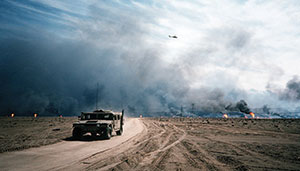
Bryant suffers from Huntington’s disease, sometimes called Huntington’s chorea, a genetic neurological disorder that can be treated, but not cured. It has been described as having ALS and Parkinson’s at the same time and runs in families.
Bryant has served his country as a Marine and the Army and deployed to Iraq during Desert Storm, said his sister, Diane Dover of Ohatchee.
Originally from Panama City, Florida, he enlisted young and was heavily influenced by family members in the military.
“I always wanted to serve my country. Growing up, people like my godfather, who was in the Air Force, were important to me,” he said.
He has nothing but praise for his military experience. In fact, after his discharge from the Marine Corps, he took on several jobs, including working as a professional truck driver, but it never was the same.
“I missed being in the military,” he said, so he signed up for the Army Reserves. “I decided to go back, and it was the best thing I ever did.”
And that decision has had a huge impact on his life today. One of his commanding officers noticed Bryant was exhibiting similar symptoms to one of his own family members and recommended he immediately see a doctor, who made the Huntington’s diagnosis.
Dover said the illness runs in her family, and she has already lost several siblings to it.
And while there is no cure, there are treatments that can make huge differences in the quality of life for patients – the earlier the better. Having the officer spot the problem early on has helped Bryant.
Because Huntington’s affects everything from speech to the ability to walk and fine motor skills, he has moved to the Col. Robert Howard Veterans Home in Pell City, a place he is quick to tell you has greatly improved his life. He says he loves living there, with other veterans and people he can relate to.
“They treat me great,” he said.
And the military has been instrumental in helping cover the expenses for treating his condition and providing a comfortable and active living environment.
His only regret? Bryant is an avid University of Alabama fan. You can instantly spot him in his crimson and white shirt in the common areas of the VA home – but no matter how many times he asks, they won’t let him paint all the walls in his room the trademark Crimson.
But aside from that, he is quick to thank the military for serving him after he has given so much of his life serving his country.
And like the others, he would sign up again without hesitation if given the opportunity.












